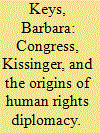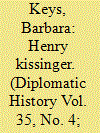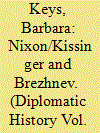| Srl | Item |
| 1 |
ID:
099987


|
|
|
|
|
| Publication |
2010.
|
| Summary/Abstract |
The Congressional "human rights insurgency" of 1973-1977 centered on the holding of public hearings to shame countries engaging in human rights abuses and on legislation cutting off aid and trade to violators. Drawing on recently declassified documents, this article shows that the State Department's thoroughly intransigent response to Congressional human rights legislation, particularly Section 502B, was driven by Kissinger alone, against the advice of his closest advisers. Many State Department officials, usually from a mixture of pragmatism and conviction, argued for cooperation with Congress or for taking the initiative on human rights issues. Kissinger's adamant refusal to cooperate left Congress to implement a reactive, punitive, and unilateral approach that would set the human rights agenda long after the Ford administration left office.
|
|
|
|
|
|
|
|
|
|
|
|
|
|
|
|
| 2 |
ID:
171852


|
|
|
|
|
| Summary/Abstract |
Two additions to the diplomatic lexicon originated during 1993 talks in Washington between Israelis and Jordanians: couch diplomacy and coffee diplomacy. The George H. W. Bush administration, brokering the talks, had included Palestinians as part of the Jordanian delegation, but because Palestinians insisted that talks pertaining to them should be conducted solely by them, the first stage of the talks was held in the lobby, a neutral place where the leaders of the Israeli and Jordanian delegations discussed procedural matters. For more than a week, the two head delegates sat on a couch in the lobby, talking about how their sides might eventually talk. As “couch diplomacy” dragged on, the delegations sat upstairs, waiting. With little else to do, members often wandered down to the lobby, where coffee was provided by the American hosts. The two delegations often crossed paths while filling their cups but studiously avoided speaking to each other.
|
|
|
|
|
|
|
|
|
|
|
|
|
|
|
|
| 3 |
ID:
106561


|
|
|
| 4 |
ID:
163144


|
|
|
|
|
| Summary/Abstract |
In June 1973, Leonid Brezhnev arrived in Washington for his second summit meeting with President Richard Nixon. Knowing of the Soviet leader's fondness for luxury automobiles, Nixon gave him a shiny Lincoln Continental. Brezhnav was delighted with the present and insisted on taking a spin around Camp David, speeding through turns while the president nervously asked him to slow down.
|
|
|
|
|
|
|
|
|
|
|
|
|
|
|
|